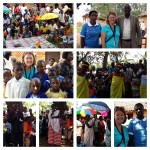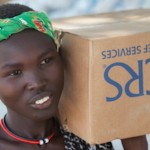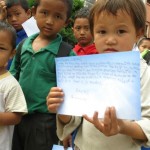Follow all of my Rwanda Journal posts here.
Today for the first time since returning home from Rwanda last Sunday night, I’m feeling back to “normal” physically. My ears have stopped ringing from thirty plus hours in the air, my ankles are back to their normal shape, and I no longer feel like bursting into tears of gratitude at the sight of a hot running shower.
But as “normal” as my body may be feeling, my heart is still reeling quite a bit from the experience of spending a week in Rwanda. I thought today that I would endeavor to capture some of these emotions before I forget them, so I hope you’ll bear with me as I share honestly here in this space.
First, I feel compelled to again thank Catholic Relief Services for offering a blogger the chance of a lifetime to participate in the Egan Fellowship. In writing of the fellowship’s namesake Eileen Egan, former CRS Executive Director Ken Hackett (now the U.S. Ambassador to the Vatican) said of Ms. Egan, “Her recognition of war refugees as human beings worthy of dignity and respect represents the basic principles through which CRS was founded.”
I obviously never met Ms. Egan, but I can say with great certainty that her attitude towards those she served continues to permeate the work of Catholic Relief Services’ staff members around the globe. From the moment we arrived at our orientation at CRS headquarters in Baltimore through the time that we departed from Rwanda, I was able to witness firsthand that “dignity and respect” with which the CRS team treated every individual we saw them serve. And perhaps those relationships we were able to enter into ourselves are the reason that now, even a few days out from the trip, my heart is aching a bit more than I had expected.
This trip was more than a “go find out facts and report a story” type of experience for me. This might be a risk of sending a blogger on a journalism fellowship. Early on, I noted my somewhat different perspective on how I would be encountering and sharing the journey. My colleagues — trained journalists representing the most highly regarded Catholic publications — were far less likely to pose for selfies with little Rwandan cuties or burst into group shots to have their photos snapped than I was. Their journalistic professionalism showed itself at every encounter we had along the road. But I think they too would tell you that this experience, at this point in time, became far more than the chance to simply report a story.
Our travels together took us half a world away to a country reeling even twenty years after being so torn apart by genocide. When you try to ponder the absolute calamity of over half a million (and by some counts over a million) souls lost in the space of one hundred days to genocide, perhaps one of the few ways to cope with the loss is to examine it clinically. But then you come to know Rwanda and her people firsthand, and such emotional separation becomes virtually impossible.
Our trip did not only involve learning about the genocide and its aftermath. As much as we dwelt on conflict resolution and how this society moves forward relationally, we also learned of economic and societal programs that provide an enviable model for recovery and prosperity to the rest of the world. And the more I was impressed by Rwanda’s emergence and vast potential, the more challenging it became to simply emotionally separate from the devastation the people I’d met had suffered.
So I think the feelings I am encountering this week as I return to my simple suburban lifestyle are as much a mourning as they are a coping with the physical nature of this trip. To not express this deep emotion I’m encountering would feel like a whitewashing of my Egan experience.
At least three times since coming home, I have suffered a nightmare based upon last week’s visit to the Murambi Genocide Memorial. While at the Memorial Centre, we stopped in several rooms containing the skeletal remains of genocide victims (for a small sample of this, you can see a photo here — be forewarned that it is graphic in nature). We saw the body of a man, buried alive, whose mouth was agape in a silent scream. We saw the tiny bodies of babies and young children, ripped from the arms of their mothers as they were killed en masse. We saw more than one female skeleton, legs spread and arms covering her face in a defensive posture as she died in the process of being raped. These images have featured in my nightmares, mixing the souls of those Rwandans lost with my own loved ones — my children, my husband, my girlfriends — killed in my dreams.
Even the description of this nightmare here feels like a belittling of those I met last week who experienced the loss of their loved ones in real life — not in a dream. But I feel compelled to share this emotional reeling with you to more fully paint the true picture of what we Egan Fellows encountered. We went, we saw, we experienced, and now it is our duty to share these feelings so that — in some very small way — we add to the defense against something so horrendous ever being perpetrated again.
I think part of my emotional reaction to the tragedy of the genocide is that it occurred in my adulthood, and completely outside of my scope of attention. I was too busy in my own world to notice, to care, to act. I can’t take back those years of not caring, not acting. But I can resolve to do better in the future.
I still have much to share about this Egan Fellowship experience, so these journal entries will continue in the weeks ahead as I unpack what we learned. There is so much good work to report on — the valiant efforts of Catholic Relief Services to provide for the Rwandan’s needs, but more importantly to work with them in building a future that is bright, prosperous, and filled with hope and faith. So future journal entries will share those programs and efforts and will encourage you to become a partner in the work CRS does around the world.
For today though, I will admit to the emotions that fill my heart. I ask you humbly to join me in prayer for the repose of all of those souls lost to violent and horrific deaths in this and other genocides, but also to pray for those left behind to cope with the loss and to care for one another in the aftermath. And would you also join me in remembering those CRS team members who have given so fully of themselves to be the Gospel — in such a hands on way — to those they serve?
For those who died, for those who lived, for those who are Jesus Christ’s hands and feet to the world around them… for ourselves, that we may translate attention and caring into service and action, we humbly pray.
Copyright 2013 Lisa M. Hendey

















